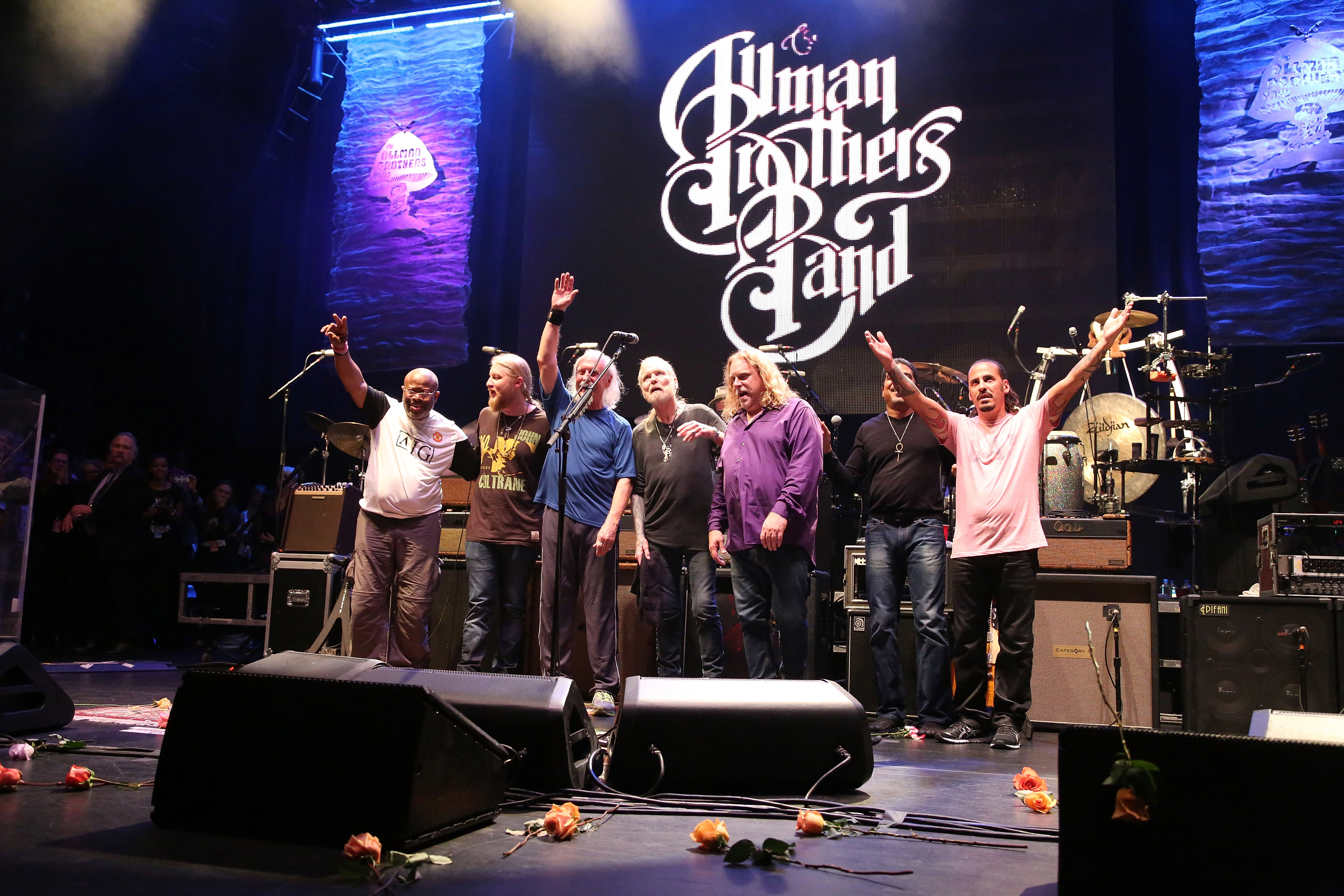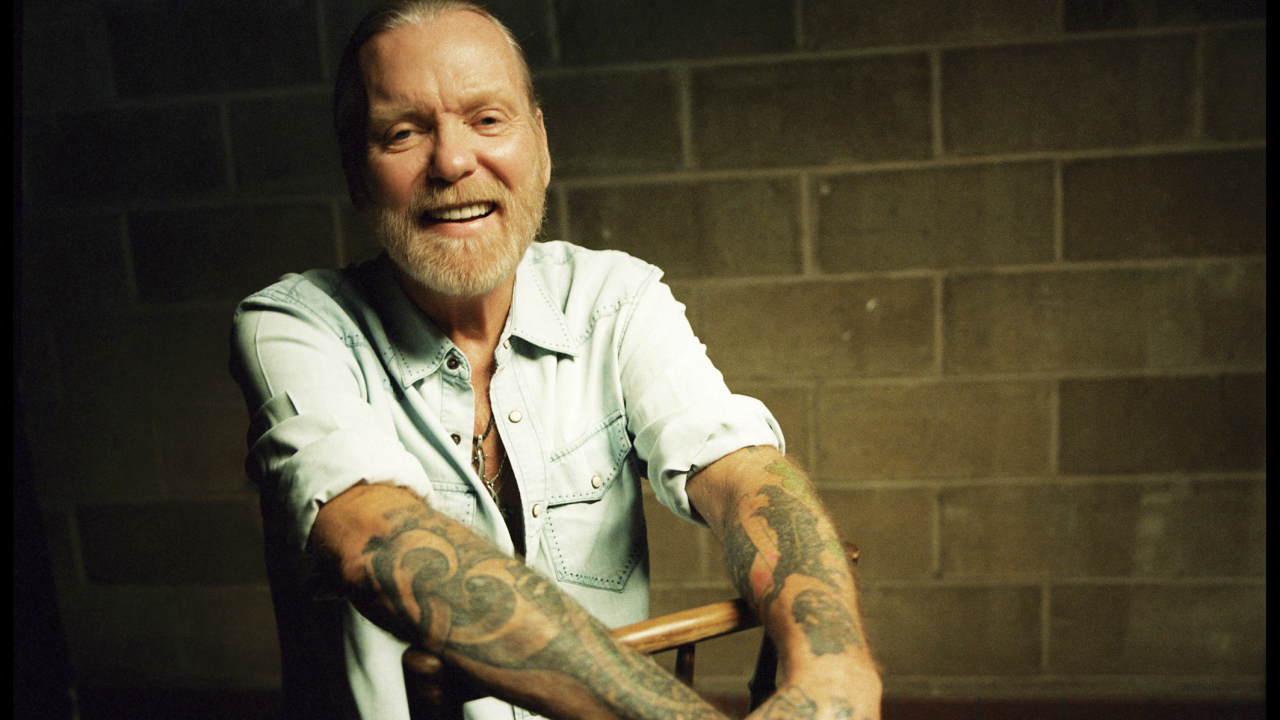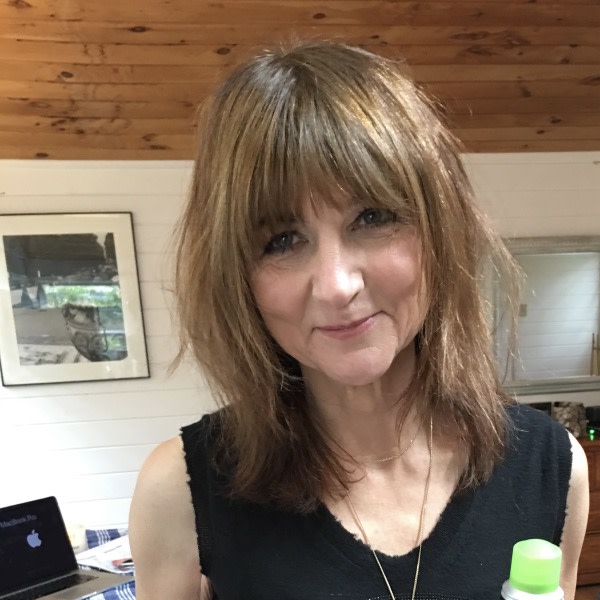When the Allman Brothers played their final show, at New York’s Beacon Theatre on October 29, 2014, on the 43rd anniversary of the day his brother Duane died in a motorcycle accident, Gregg Allman told the audience in a quiet voice: “Never did I have any idea it would end like this.” This from the man who wrote the prophetic words in Midnight Rider: ‘The road goes on forever.’ But while the Allman Brothers Band might have reached the end of the road, Gregg Allman’s new path is just beginning.
As 2014 draws to a close, Allman is clearly a man reborn, perhaps related to having undergone a liver transplant in 2010. Next month he embarks on a tour with the band he’s assembled over the past eight years, on which he’ll perform Allman Brothers songs without any reservations (“I did write them, after all”). He has a spring wedding planned with his 27-year-old fiancée, two albums and a rare UK appearance, at Classic Rock’s Ramblin’ Man festival, scheduled for next year, and he and his manager Michael Lehman recently endowed a scholarship at Syracuse University for students in need.
All this from a man who never planned on becoming one of America’s most recognisable white blues singers. Fortunately, life had other plans, and the slurry, blurry, often dangerous magic of Allman’s voice carried on the subversive blues-rock legacy that his brother began 45 years ago.
Sitting on a sofa in Los Angeles’ fabled Sunset Marquis hotel, Allman is as lithe as he was when the ABB closed down Bill Graham’s Fillmore East. He has a bit of a cough. “It was cold in New York, I caught it there. I had a lot going on,” is about all he will allow about the huge undertaking of dismantling the Allman Brothers at the Beacon Theatre. But, if anything, Gregory Lenoir Allman is always understated, from his fine-gauge navy sweater, to the silver jewellery, to his famous blond hair tied up with a plain rubber band. Only a few of his tattoos peek out from beneath his sweater: three shamrocks, a flower and part of a musical staff.
Sitting on a sofa in Los Angeles’ fabled Sunset Marquis hotel, Allman is as lithe as he was when the ABB closed down Bill Graham’s Fillmore East. He has a bit of a cough. “It was cold in New York, I caught it there. I had a lot going on,” is about all he will allow about the huge undertaking of dismantling the Allman Brothers at the Beacon Theatre. But, if anything, Gregory Lenoir Allman is always understated, from his fine-gauge navy sweater, to the silver jewellery, to his famous blond hair tied up with a plain rubber band. Only a few of his tattoos peek out from beneath his sweater: three shamrocks, a flower and part of a musical staff.
The first time I interviewed Allman, during ABB’s Win Lose Or Draw tour in 1975, he had just two: the mushroom that all the band members had, and one of Wile E Coyote – his then spirit cartoon. Many tattoos and big life events have come along over those four decades. Today Gregg Allman is a much more reflective man, comfortable in his body, his eyes still the colour of a thundercloud; but no longer are there any storms on the horizon. This is a man who looks like he has finally made peace with his choices – especially the difficult ones.
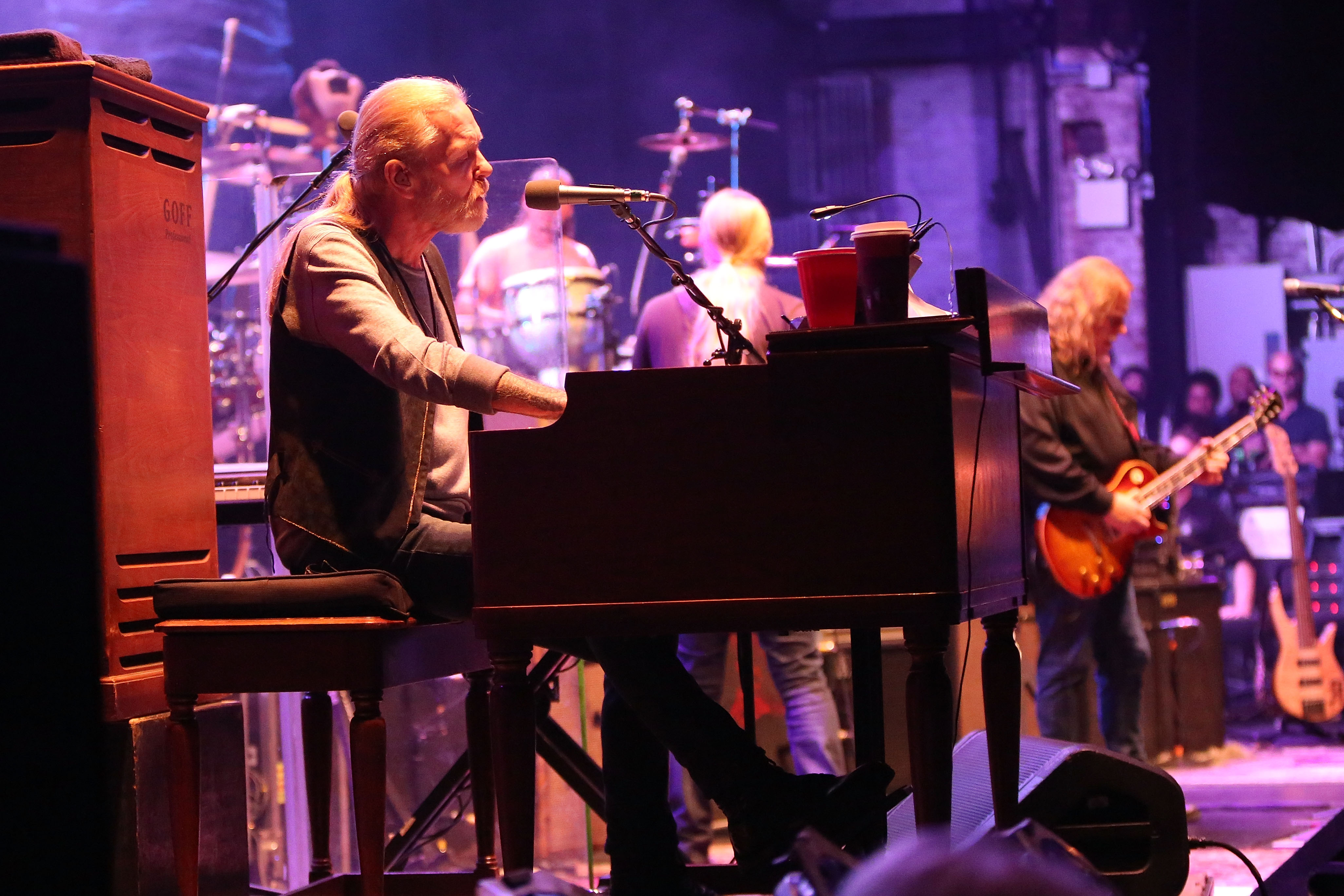
You’ve had an eventful twelve months: the end of the Allman Brothers Band, the lawsuits over your film – and you finally being absolved of any guilt. Those are really big events.
They really are.
Did you expect it to be a tumultuous year?
I had thought maybe it was going to be. Next year is going to be the goodie, because I have a new band that I’ve put together over the past eight years and they were really getting good. We’ve got some great arrangements of some old songs I wrote, and we’ve got a bunch of new stuff. I hope to get in the studio, maybe this time next year.
**The Allman Brothers have now played their final shows. What reaction are you having because you ended something you’ve done for forty-five years? **
Well, no, I didn’t let go of playing. I didn’t let go of the blues.
**But you did something very significant and final. **
Change is good. It’s scary but it’s good.
**You chose to conclude those shows on October 29, which is the anniversary of your brother Duane’s death. **
It was all dedicated to him. We had some beautiful pictures of him up on the screen.
You played some of his guitars, too. Why was that?
We did it because I heard my niece, Galadrielle, was going to bring her father’s guitars to the Beacon. She was going to get them out of the Hall Of Fame and bring them. And I thought: “Man, that might be a bad idea. Because if the people find out, someone might try to steal them.” It wasn’t going to be a bad idea bringing them, but I mean getting away from here, everybody’s going to know what we have with us, and who’s going to watch them? I worry about things like that. But I didn’t need to. After they used them they went straight back out to the car and were locked in the trunk. But it was a wonderful final string of shows.
**What were you thinking about – did you feel Duane’s presence during the Beacon shows? **
Not a day goes by I don’t think of him, or something we did, somewhere we went… Every time I walk up on the stage I still feel like he’s standing right there next to me. He never talked much about dying. Somehow I think he never did. For a long time ago I heard my mother tell me: “A person doesn’t die if he stays in your heart and in your thoughts.” Duane is always with me.
It’s like there’s this other plane that people still exist on. Do you get that sense with Duane?
I do. It’s like he’s gone to another country or something, and he just steps back in every now and then. I’ve had some real vivid dreams about him. I remember talking with him. When I was having my liver transplant they tried some kind of miracle drug on me and it about killed me. And, you know, I barely remember it except I had this dream.
There was this little creek, and it had one of those little Japanese walkway bridges. I was on one side of the creek and there he was on the other side, and he had one of those hats that they wear in the rice paddies to keep the sun off his face. As I was approaching the walkway, he kept walking away. I never got too close to him. When I woke up I looked around the room and everybody’s eyes are wide. I think they thought I wasn’t going to make it. But when I woke up I said: “What’s up, guy?” Course, he wasn’t there any more.
Did you get the sense that you weren’t supposed to cross that bridge yet?
Yes I do. That gives me a lot of faith.
What do you believe? Where do we go when we die?
I have never thought you’re just dead, that’s it. I mean, after all this? There’s got to be more.
I interviewed Jerry Lee Lewis recently.
You earned your pay that day.
I did. But what brings him to mind is that, like him, you’re the last man standing from a certain era. Especially of those who were rather excessive in their habits. You and Iggy Pop beat everyone’s expectations. But some place deep within you, despite the fourteen trips to rehab, this road really did go on forever.
Oh, yeah. Wait, did you compare me to Iggy Pop?
I did.
Ha ha ha!
You must have known the road really would go on forever for you to have written those words way back then in… when was it?
Let me see. That was in 1970. No, it was ’71. My brother was in on it. And in 1970 we worked three hundred and six nights and we were gone from home a whole year. That might work for John Mayall, but not me. I did a tour with John Mayall a little while ago and he showed me his itinerary. It was that thick. I said: “Man, this is next year?” He said: “Here you are griping about having to work so hard.” And he’s eighty – fifteen years older than me.
Maybe he thinks if he keeps booking dates then he won’t die because he’s made other plans.
There you go. But it’s not that I don’t like to play, it’s the travelling I hate. If I ever retire I will retire from travelling, not from playing. I’d like a career with less travel. I’m almost a white-knuckle flyer these days. I don’t want to get back into drugs, but the only thing that would ever tempt me to take something is a damned airplane.
**John Lee Hooker used to phone you, and Buddy Guy said that you keep the blues alive. **
John Lee used to call me on my birthday and tell me he loved me. He was religious about it. I loved how he dressed up, the hat and the whole bit.
**BB King is like that too. **
He’s my friend. A real friend. Willie Dixon was too. I met Muddy Waters and Willie when I went over to Willie’s house in Chicago. It was a housing project, actually, on South Racine Street. His wife cooked us fried chicken and collard greens and sweet potato pie. I brought over a twenty-one-year-old bottle of Scotch. It’s made by Chivas. It’s real expensive; I mean, even back then it was about seventy dollars a bottle.
This was around when he just had his leg cut off. Diabetes. He had a broomstick where it should be, with a shoe on the end of it, and… it was so cool, man. He was so knocked out with that bottle of Scotch. He thought it was something else. And the fact that I brought the limousine over to his house. I spent about four hours with him, and finally he went to sleep while we were talking. “Now I have to go to sleep,” he says. “Don’t get offended!” Nothing this man could do could offend me.
That day was probably as good as any compliment you’ve ever received.
With compliments it has a lot to do with who’s giving it. I’ve had some nice ones. But my favourite was in a letter. It’s hanging in my master bathroom, because I like to read it every now and then. The guy who wrote it said: “I’ve been following the Allman Brothers all my life, and now I’m following your band.” He went on to say: “Of all the bands out there, yours is the most honest [I think he said honest] and you’re one of the last of your kind. I would take my children to see you because I know they would be enriched by seeing you play.” It was just the way he worded it, it was just beautiful.
Somebody once said about you that all your songwriting comes from just looking for love, never giving up on it.
I’ve got it now. We’ve been together now three years. We’re going to get married in springtime. I found one woman and that’s fine. You meet somebody, and every day you learn something else about them. And she does not treat me like a celebrity. She’s twenty-seven years old – forty years’ difference.
Your mother, Mama A, has always been a big presence in your life. Is she still alive?
Yeah. She’s 97.
**You’re a different man now compared to the man I interviewed back in 1975. **
I hope so. It took me a long time to get up fool’s hill, you know?
Do you still smoke pot?
I do.
Does that play havoc with your sobriety?
No. I didn’t have to go to rehab for that.
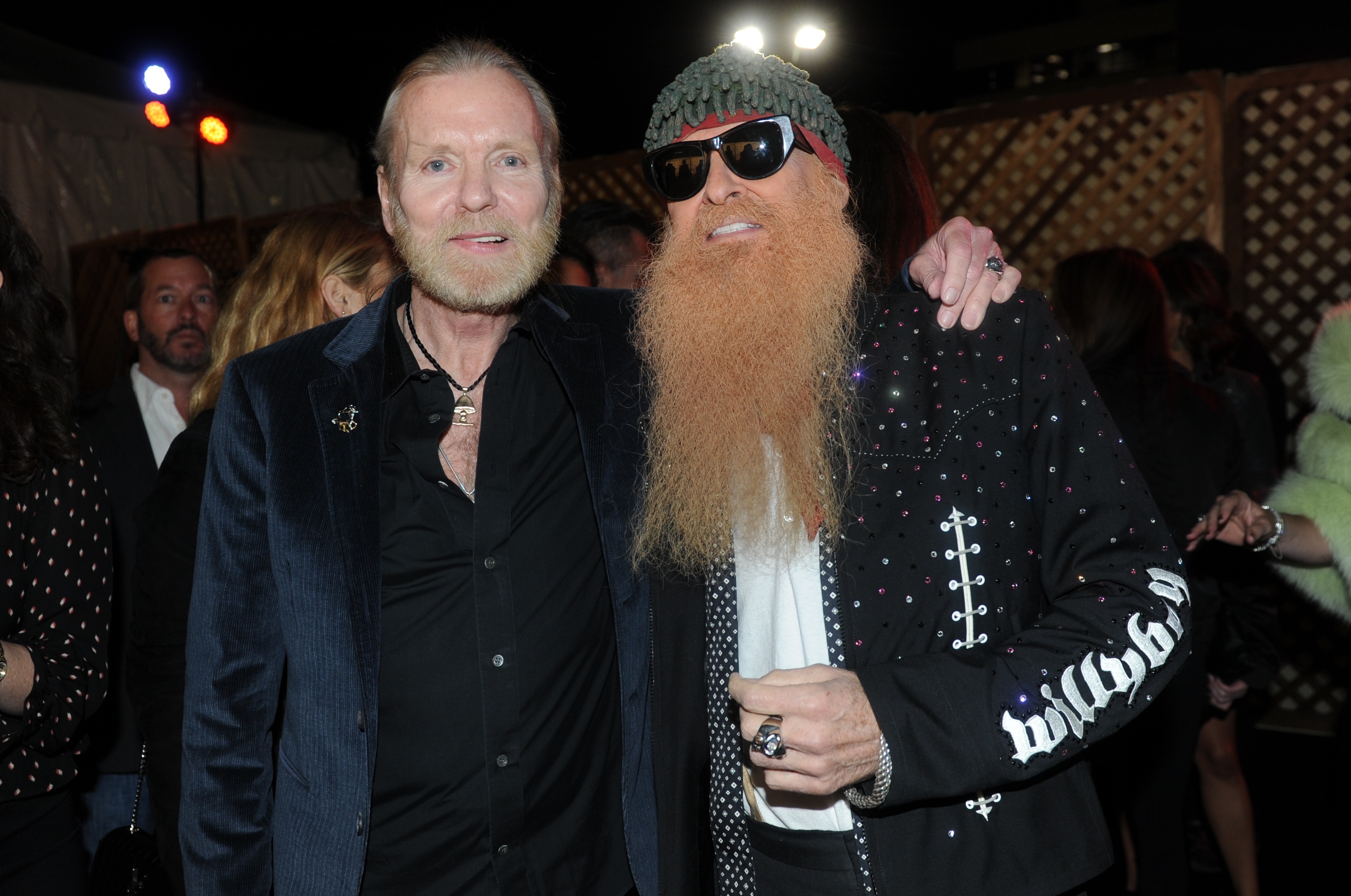
You’ve just received Classic Rock’s Living Legend award. Did you always know you had an extraordinary gift?
Absolutely not! I’ve never thought my voice would even warrant putting on the radio, I never thought it would be good enough. It’s only been about ten or fifteen years where I stopped doubting myself. You’re your worst critic and you sound like a million other people at once, and then pretty soon one day you wake up and say: “Well, by God, I do have a style all my own.”
Was there a moment where you thought: okay, I’m in the right place at the right time?
Oh, hundreds of thousands of moments like that. Even though I was barely there, I really was proud when I got inducted in the Hall Of Fame. I just wish we could redo it, that night. You know, let me have another crack at that acceptance speech. But I think that’s what it took to wake me up into getting sober.
What do people always get wrong about you?
A lot of times shyness can be misconstrued for people being stuck up. I don’t really let out that much personal stuff. I don’t talk much on stage, because I just… I don’t have anything to say. If you have something to say, I believe in saying it, but if you have to create something to try to be cool or to try to be witty… that’s not me.
You seem so stoic most of the time.
I’m taking it all in. My grandmother once told me it’s the quiet ones you have to watch. The guy running his mouth over there, you don’t have to worry about him at all.
Now you’ve done your final show as an Allman Brother, what do you think the legacy of the band is?
I think the most important thing is we never had anybody ask for their money back. I’ve never left a concert thinking: “We sure short-changed them. That sure was a shitty show.” I still always play like it’s going to be my last show.
